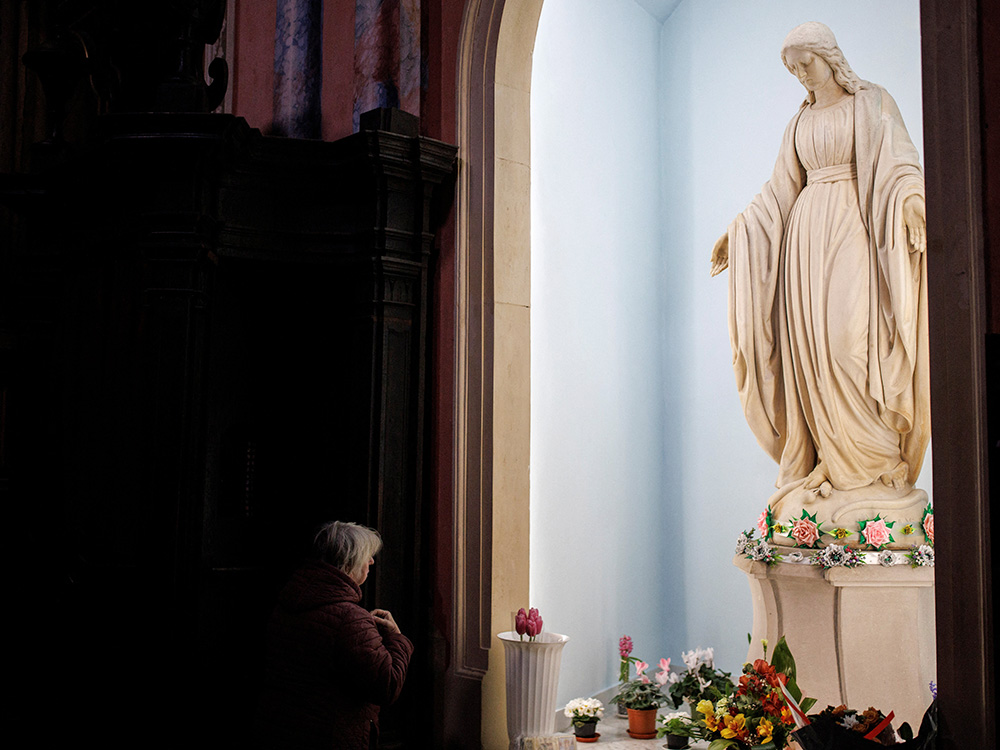
A woman prays in front of a statue of Mary on March 29, 2022, inside Bernardine Monastery in Lviv, Ukraine. (CNS/Reuters/Alkis Konstantinidis)
In the 14 months since the Russian invasion of Ukraine, Catholic sisters have struggled to keep the spirit, promise and vision of Easter and Resurrection alive day-to-day.
It's not impossible, but it is challenging.
"This experience in our country has been difficult — difficult for everyone," said Sr. Veronika Yaniv of the Sisters Catechists of St. Anne.
"The war came. It changed everything," said Sr. Anna Andrusiv of the Sisters of the Order of St. Basil the Great.
Those changes — unexpected and unwelcome — compounded personal and communal challenges.
When the full-scale invasion began on Feb. 24, 2022, Yaniv was mourning the loss of her mother, who had died 12 days before, and she had only been the superior of her community for two months.
She and another sister had planned to cross into Poland to take a formation course for nuns but ultimately decided to stay together in community in Lviv.
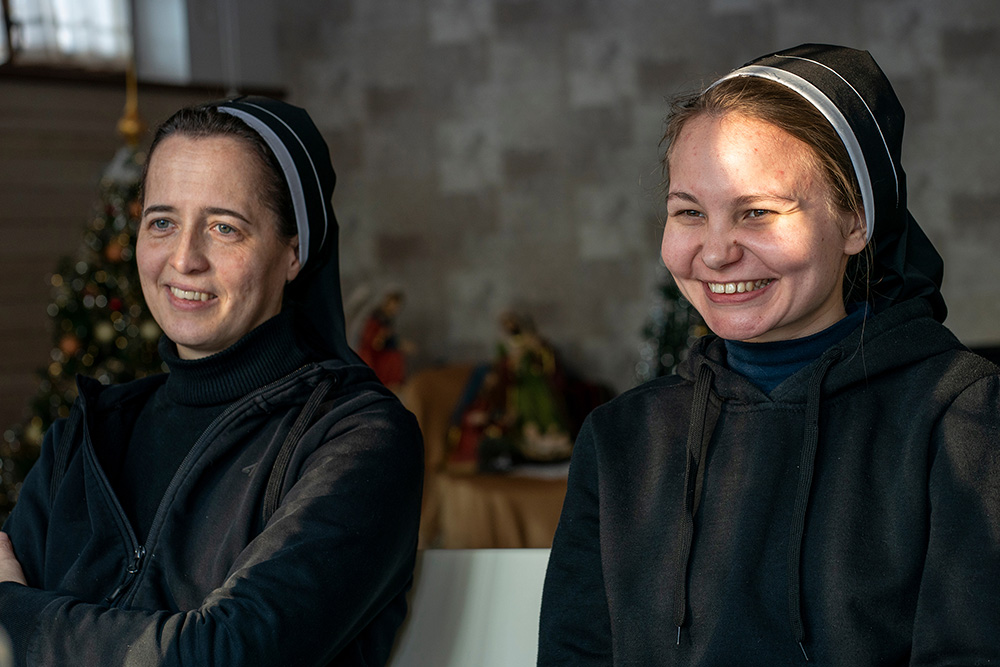
Sr. Veronika Yaniv, left, and Sr. Josafata Zapotichna speak of the challenges of the year since Russia's invasion of Ukraine. In caring for people displaced from eastern Ukraine, they say they have created "a peace village" within their monastery. "Behind these stories, you can see how this war seeps into people's lives," Zapotichna said. (GSR photo/Gregg Brekke)
"We didn't know what would happen," Yaniv recalled recently in an interview with Global Sisters Report at the community's monastery. The sisters also considered leaving and helping family members elsewhere in Ukraine or even in other countries.
Ultimately, the St. Anne sisters opted to do what they could to help those fleeing the war, particularly travelers coming from eastern Ukraine. Early in the war, for example, the sisters drove seriously ill and disabled children who required medical care across the border into Poland.
With so many people from eastern Ukraine fleeing their homes because of constant Russian shelling, the sisters reconsidered how to use their monastery property in Bryukhovychi, about 6 miles northwest of Lviv.
The property was built in 1991, but the sisters had remained in community in Lviv in recent years because of the monastery's rising utility bills. They used the convent primarily for organized retreats and events, such as evangelization workshops and catechesis classes.
But with the visitors arriving, four sisters decided to move back to Bryukhovychi in May 2022 to live with the new arrivals and help organize their stay in the house.
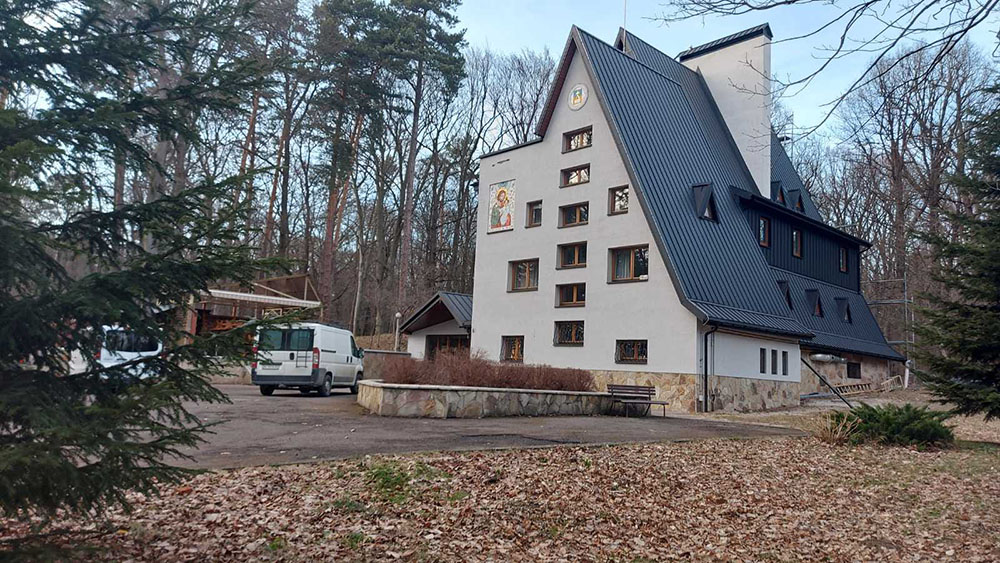
The Sisters Catechists of St. Anne's monastery property in Bryukhovychi, about 6 miles northwest of Lviv. The property was built in 1991, but the sisters had remained in community in Lviv in recent years because of the monastery's rising utility bills. Before the war, they used the convent primarily for organized retreats and events, such as evangelization workshops and catechesis classes. (Courtesy of Veronika Yaniv)
The decision was made prayerfully but with a bit of trepidation.
"This thing we did took some courage," Yaniv said. "It was something concrete we could do, housing people here. But we didn't know how to do it."
Representatives of Jesuit Refugee Service in Lviv offered to assist the congregation with logistics and financial support to help buy everything necessary for the arrivals and their stays. Additional financial support came from the International Union of Superiors General and the U.S.-based Sisters Rising Worldwide, which are among the groups that have provided assistance to congregations in Ukraine, Poland and elsewhere in Europe that offer sanctuary to Ukrainian families seeking refuge.
With financial support came fewer worries for the sisters, and with more arrivals came "more courage and more motivation to help people," Yaniv said.
"We have a home for people," she said, "and it's been wonderful that we could help people."
Though the monastery can house 25 people, for now, it is home to 19: six mothers, seven children and six retirees. The presence of children and infants has brightened the house, filling the monastery with cries, laughter and the joy of the unpredictable.
"The children feel our home is filled with love," Yaniv said.
The residents come from different parts of eastern Ukraine, creating a rich mosaic also based in Ukraine's complex history. Yaniv calls the monastery "a 'peace shelter' where a community of unity in diversity is created."
Sr. Veronika Yaniv of the Sisters Catechists of St. Anne holds up a baby at the sisters' monastery outside of Lviv, Ukraine, which is currently home to six mothers, seven children and six retirees. (GSR photo/Gregg Brekke)
One of the older couples, 64-year-old Mykhailo and 63-year-old Elena, are from the Donetsk region, Russian-controlled areas in eastern Ukraine that Ukrainian forces are trying to reclaim. As such, they are afraid of being identified publicly, given that some of their neighbors in the city of Slovyansk are pro-Russia. Due to those fears, they asked that their family names not be used and that their given names be altered.
In contrast to Lviv, sometimes called the "soul" of Ukraine, Russian linguistic and cultural influences continue in the east, and with it, fear and anxiety. Mykhailo, a retired vocational trades teacher, and Elena, a retired flower factory worker, recalled that their lives under Soviet rule were stable. (Like many people from the east, Russian is the couple's first language.)
They said the initial years of Ukrainian independence were sometimes rocky, but they stressed that they do not want to return to the Soviet era.
"We're Ukrainians," Elena said.
They opted to leave their home in early April 2022 and ended up in a whirlwind of travel across borders that included time in Poland, Italy, France, Germany and Switzerland. After several weeks of cross-border travel, they decided to return to Ukraine: Given their ages, it would be hard to start over and master the language of a new country, and in Ukraine, they have easier access to their government pensions.
A couple they met in Zurich told them about the possibility of staying in Lviv, and they moved in with the sisters in May 2022.
With two daughters and several grandchildren remaining elsewhere in Ukraine, Mykhailo and Elena still hope to return home, maybe as soon as this spring. But the front line has gotten closer to their home city, and the war continues its relentless, droning drumbeat, so for now, the couple remains with the St. Anne sisters.
"Hope dies last," Elena said.
Advertisement
Though grateful for their refuge at the monastery, Mykhailo and Elena mourn what was: They own a cottage outside of Slovyansk — not far from the front lines — that was looted and is now essentially lost.
"Nothing is left," Elena said.
Mykhailo said the sisters care for those at the monastery, checking in on their well-being and sharing meals with the refugees. "We feel safe here," he said.
Yaniv and another sister, Sr. Josafata Zapotichna, listened to the couple's story with care and compassion.
"Behind these stories, you can see how this war seeps into people's lives," Zapotichna said.
Yaniv said those staying with the sisters have been a mixture of faithful and nonobservant, which has not been a concern. "For some, we are the face of God and faith, and for others, we are figures of help."
Either view, Yaniv said, is fine.
"We accompany them in their difficult situation," she said. "They see what we do is good."
Similar feelings animate the experiences of Andrusiv and her sisters, who offered short-term shelter to visitors heading west to Poland and other countries during the first six months of the war.
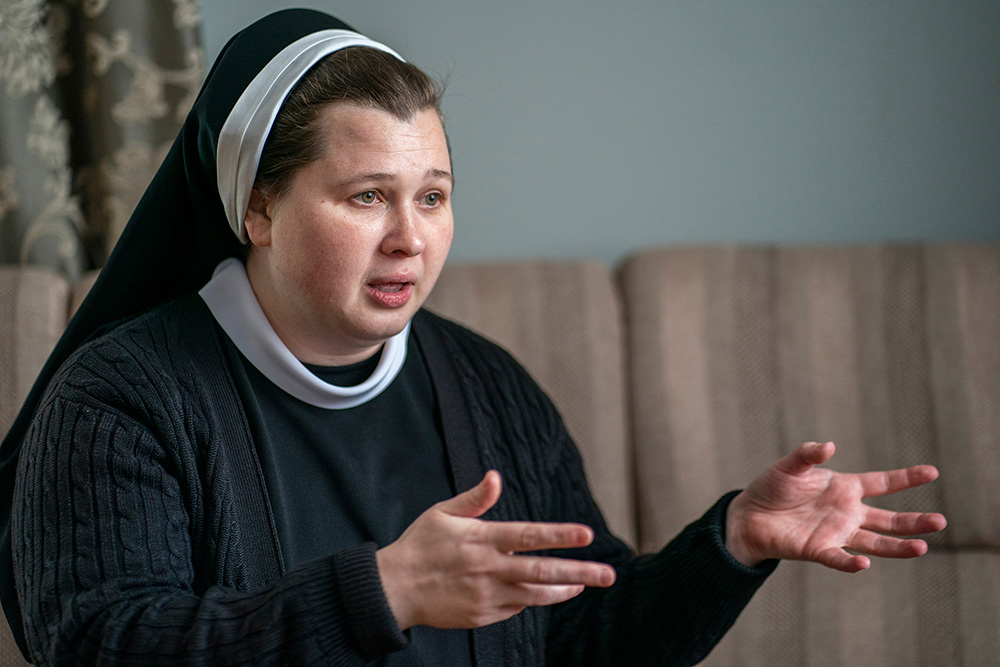
Sr. Anna Andrusiv of the Sisters of the Order of St. Basil the Great. "Day to day, we've become used to it," Andrusiv said of the air-raid sirens over Lviv, Ukraine. "People can get used to anything." (GSR photo/Gregg Brekke)
Though Lviv, about 50 miles east of the border with Poland, was a destination for some, for most, it was a temporary transit point. The Basilian sisters opened their quarters there to visitors shortly after the war began, though most stayed just overnight.
In other Basilian monasteries in western Ukraine, others stayed longer, up to six months. In total, three monasteries hosted hundreds of visitors in 2022. Notable at the monastery in Yavoriv: the birth of a child.
Some people left because they found more permanent housing elsewhere and "started a new life," Andrusiv said. Others, like the mother with the newborn, went abroad.
In Lviv, the sisters prepared basement quarters for the visitors, a kind of bunkerlike environment the sisters used as shelter when air-raid sirens went off.
The sirens continue, but now, the sisters and the other residents of Lviv rarely take shelter, mostly continuing their routines.
"Day to day, we've become used to it. People can get used to anything," Andrusiv said. But, she added, "we have this pressure on us. Every time you hear that siren, you feel that pressure, and it's never-ending."
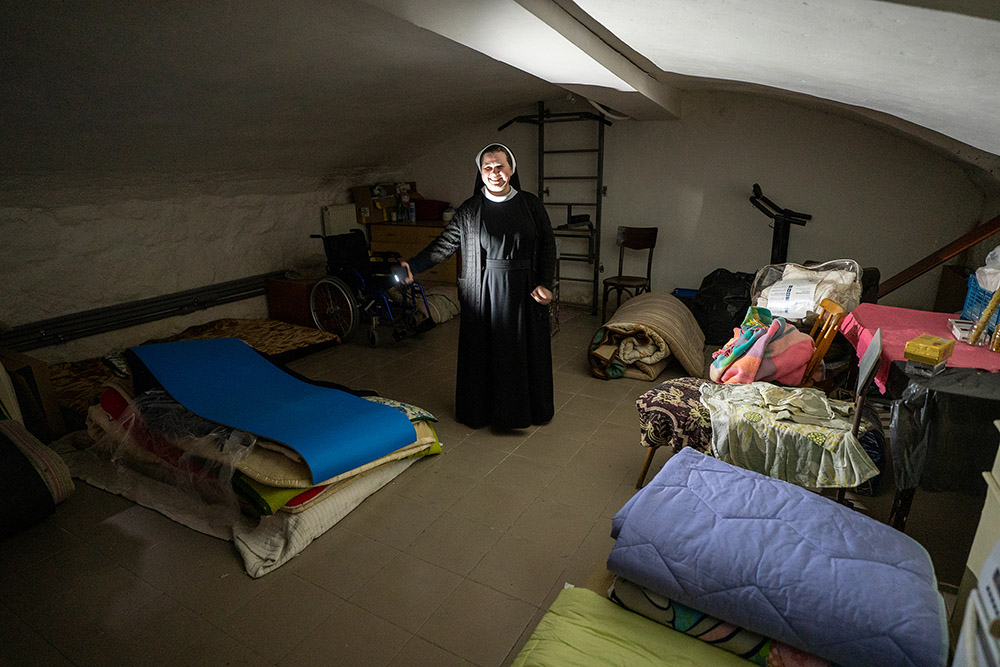
Basilian Sr. Anna Andrusiv shows visitors how sisters prepared basement quarters in Lviv, Ukraine, for visitors heading west to Poland and other countries during the first six months of the Russia-Ukraine war. The Sisters of the Order of St. Basil the Great also used the basement as a shelter when air-raid sirens went off. (GSR photo/Gregg Brekke)
The ministries continue, Andrusiv said, with a particular focus on collecting and shipping food, medicine and clothing to soldiers and others in need in the east.
Both Andrusiv and Yaniv say Easter — which the Orthodox and Eastern rite churches in Ukraine celebrate a week later than the Western church — will be a welcome respite from the tensions of the last 14 months, though the war will never be, and indeed cannot be, out of their thoughts.
Uncertainty remains in the air — but not forever.
"Although we do not know exactly the day and hour when we will win this victory, we know for sure that this time of Resurrection-victory will be, because the good always wins over evil, but it is only a matter of time, about which only the Lord knows," Yaniv wrote in a recent email to GSR.
Like so many other Ukrainians, Andrusiv frames the hope of resurrection through the lens of Ukraine's current reality.
"We are waiting," she said. "Christ will rise, and Ukraine will rise. And the people of Ukraine will always fight for Ukraine to rise."







